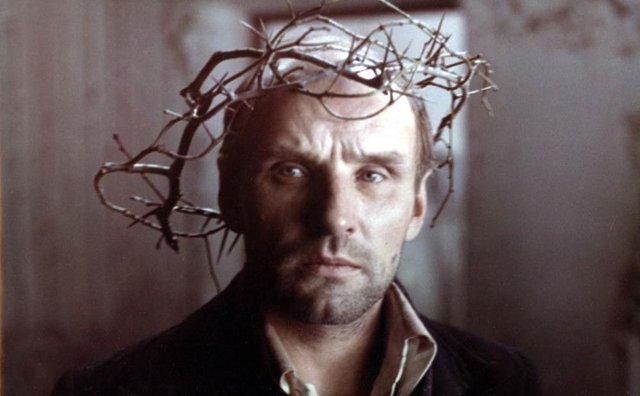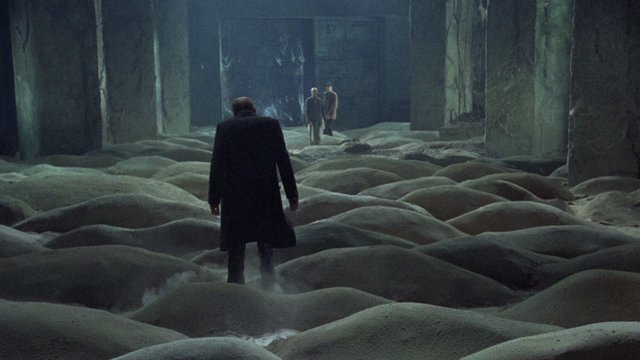🎬 FILM ESSAY : STALKER / Andrei Tarkovsky
After filming Nostalgia and before his last film Sacrifice, Andrei Tarkovsky in his probably the most meaningful interview [1] says that this world is not given to man in order to be happy in it, and that perhaps the greatest challenge is to get to know yourself. All Andrei Tarkovsky's films from Ivan's childhood to the latest film shot in Swedish production before the director's death can stand between these two coordinates, at least in their thematic and conceptual sense. But what does the thematic framework and selection of the creator tell us about his work? Well, nothing or almost nothing.
Most of those who wrote about the films of this Russian director fell into the temptations of personal insights or variations on one of the "main" subjects of Tarkovsky, and so they actually wrote their own reflections on certain problems, and about the films themselves if they said a bit. What is it that makes one movie an artistic? In the modern world it seems to be hardest to say because the film as art is on the very edge of the art piece and increasingly into the commercial "treasure" and Hollywood blockbuster paradigm.
Tarkovsky himself said that the film for him was in time, and the criterion by which he differs from other arts, that is, his basic unit is a rhythm. Already, on the first ball we see that the terms that the director chooses to formulate their manifest are quite picturesque, i.e. borrowed from the theories of other arts (fine arts, musical). In his redesign manifest called the Sculpting in Time [2], Tarkovsky writes that the characteristic of his films is that he tries to follow the logic of emotions, the logic of something super-real, in the editorial process, and that so achieving penetration into the spiritual world, and the "hieroglyph of the absolute truth". [3] Naming the rhythm as a differentia specifica of his film, Tarkovsky tries to mark a certain internal dynamics of "images" in the film, which the director finds more in his intuition, rather than deliberate intention.

The poetics of Tarkovsky in this film, as well as in the Mirror and Nostalgia, owe a little bit of the haiku poetry experience [12], which Tarkovski read and very respected. This topic goes beyond the margins of this work, it should be explored within a special topic, but it should also be noted that a future viewer would have in mind while trying to figure out the secret of Andrei Tarkovsky's films, and his films are certainly a secret.
Stalker plot is very simple and it was written so many times, so this time let's skip this repetition. We will follow the direction of the director himself. Tarkovsky wrote that he wanted to make a film about "what is dignity, and how can a man suffer if there is no self-esteem"[13]. And that gives us the entrance to the melancholy lobby, because if sadness is a sadness for some lost object, fictitious or realistic, melancholy is a variation of grief, especially with the "loss of self-esteem" [14]. Who loses self-esteem, why he loses it and where does the loss lead him?
This spiritual phenomenon, which is not characteristic of a particular geographical area, although it is "embedded in the cultural pattern of Western civilizations" [15], has multiple incarnations and modalities, from existential emptiness, indicators of the genius of the individual, spiritual moors to the feeling of emptiness and imperfection. A melancholy constant that can incorporate all of the above-mentioned moods into itself is a feeling of transience. [16] Melancholia brings with it excellent state of mind, titrating the most intimate in the being. Only a melancholy can feel the "fullness of existence" [17], but only in conjunction with a view of nothingness. Thus, melancholy itself becomes a paradox, but it doesn't disappear from the spirit.
What does that have to do with our Stalker?
From the beginning of the film, one specific mood was emphasized, one atmosphere among the heroes, which fills the Stalker, and which we tend to call melancholic. Two representatives of the society, the social elite: The Writer and the Professor reveal their intentions at the beginning of the trip to the Zone. The writer in lamentation at the beginning of the film regrets the Middle Ages, that is, for the mankind that was young in the Middle Ages, and now the world is boring, because there is no telepathy or deception. What does this tell us?
The writer, as a social figure leading the society in a spiritual sense, sketches the contemporary spiritual situation in several sentences. The youth characteristic of the Middle Ages, would present here, a spiritual freshness and serenity, a world with a strictly determined and established center - and that is God himself. So far, the dominant contemporary phenomenon has been excluded from the Middle Ages because in the Middle Ages, the spiritual situation is primarily determined by a religious view of the world, it's determined by faith. In a situation where God remains "alive and active", the meaning of individual existence is guaranteed, or at least mediated through the subjective experience of faith.
The modern world is the world dominantly secular (non-religious), but more importantly, with the disappearance of religion from the historical scene, also faith disappeared (faith as a psychological term, not purely religious). The writer is self-aware. He knows that his writing is a job, a profession, not an invitation (as Tarkovsky insisted), and that his role is essentially an egoistic rather than altruistic one.
He ceded to cynicism [18], and writing (which is appreciated or not?) is just an instrument to prove to others that something is worthwhile, although he knows that he would certainly not write if he was a genius.
Here we encounter another melancholy derivative, because the melancholy is from the old age, and through Direr until the modern age it was bound to the genius, as a certain color of genius. Like the Professor, whose fate is even more underlined [19], the Writer is not a "genius." The genius reveals things, and our heroes rule certain knowledge, aware of the destructiveness of their ego.
As cynics, they are still tied to the world, bound with the bitterness of disappointing expectations that doesn't give the possibility of forgiveness. They have not yet crossed into post-cynicism [20], which signifies a pessimistic view of the world, but the post-cynic is cut off to the world, doesn't feel any emotional or moral responsibility to the world.
On the other hand, Stalker is someone who has chosen to be the guide through the Zone, the guide the desperate on the way to Hope. Deeply committed to his work, to the extent that he leaves his wife in despair, conscious of all the obscenity that this profession carries, [21]
Stalker is the one who carries faith, despite the miserable life, despite the immobile daughter-mutant, he persists in his call, though there is a certain recurrence in Stalker's personality.
Stalker is not simply a christian figure, such as Dostoevsky's Alyosha Karamazov. Stalker's faith is a belief-in-hope, so the question remains whether Stalker believes that he hopes or hopes to believe. But let's go back to the above mentioned recidivism.
Although there is a certain degree of belief present in Stalker's character, there is a second half of his personality, that precipitate at the bottom of a creature that, apparently, no faith can disperse. Let's remember just the scenes on the way to the Zone, and they are accentuated by the sepia tone in the frames when Stalker is immovable in the water with a face expressing emotions ranging from fear and despair to helplessness [22]. How this feels to someone who believes?
The feeling that Stalker is bearing is that knowledge is insufficient and meaningless, and yet the truth is insecure, and that feeling of truth and knowledge would be called melancholy. It is a dialectic of melancholy written by Guardini. The feeling it awakens in a man is a feeling of constant unrest, a growing uncertainty that is spreading, "whose boundaries can not be determined" [24].
Awareness of the infinity of the cosmos, the impossibility of absolute knowledge, and, on the other hand, human transience and death makes Stalker the authentic bearer of modern melancholy. When the Professor and the Writer transfer him to use another's misfortune to gain profits, we see that Stalker himself is one of those desperate ones who, with each new entry into the zone, renews faith in himself.
He needs the Zone to keep his faith alive. His faith (in salvation or God, if we speak in Christian terms) is not monolithic and homogeneous. It is spread within itself with a modern consciousness, because Tarkovsky's overall view of the world forms only as three faces of one being, three forms of the spirit.
Stalker is actually a passion for an absolute in (yet) a skeptical soul, or for the great melancholic Sioran said "an angel on top of the leper." [25] He has the need for an absolute, for Truth, which science and art seem to lose at the present moment. It's a melancholy feeling that "there is anyone who is not immortal ... with whom no suffering can be compared in this world." [26].
This was my translation from Serbian to English from PULSE article ''Сталкер – анђео или губавац'' by M.Avramovic
________________________________________________
If you're fan of Andrei Tarkovsky:
Here is another different review I did for STALKER
And here is essay about MIRROR (ZERKALO)
_________________________________________________
Thank your for reading, and invest in my existence! :)



really a great summary of this film,,,,,,your presentation was too excellent.......i think..i don't have to need go theater for this film,,,your summary enough for me....thanks for your post........all the best.....
@abontikazaman
Thank you so much,
but definitely go to see this film, it's one of those films that you will remember your whole life!
impressive work! I recently ran into a problem - it was necessary to write a resume in order to get a job in a state management structure. The failure rate was very high. Therefore, I turned to the resume booster from Careersbooster, and I can say that they did an excellent job with the task! Everything was written on time, they always stay in touch with you. Now I passed the first round of the interview, I'm waiting for the second!
Thank you